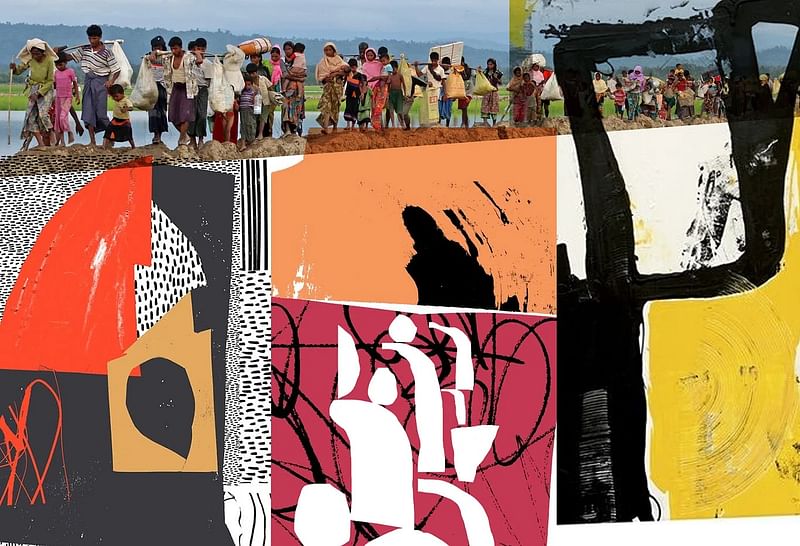
Even though a civilian government was apparently at the helm in Myanmar, the power was clearly in the hands of the armed forces. And the head of government Aung San Suu Kyi continued to appease them. So there are a several opinions as to why, then, this military coup took place in Myanmar.
Experts have identified two major reasons behind this. After a long struggle and finally and an understanding, in 2015 Suu Kyi’s party formed the government with a majority mandate. The military rulers thought that this wave would gradually abate and their grip on the parliament would tighten. But quite the opposite occurred in the 2020 election. Suu Kyi’s party, National League for Democracy (NLD), clinched a landslide victory. The military-backed Union Solidarity and Development Party (USDP) secured even fewer seats than before. So the fear arose that if this trend continued, the military’s absolute authority in the country may begin to wane in time.
The second reason is that Senior General Min Aung Hlaing, the commander-in-chief of the armed forces in Myanmar, is retiring soon. He has been accused in international courts for the genocide committed against the Rohingyas. There are US sanctions against him too. Once out of power, he may fall into trouble. He had wanted to become president so that, on one hand, he would have power, and on the other, impunity. Suu Kyi reportedly did not agree to this.
China’s reaction was absolutely the opposite of the West. It has not even considered this to be a military coup. They see this as a reshuffling of the cabinet. It is very clear that China will back the military junta. An emergency meeting of the UN Security Council was held on 2 February to discuss the matter, but China vetoed the draft declaration in this regard.
In contest of the coup, will there be any significant change in regional geopolitics? China remains strongly in support of Myanmar. It needs Myanmar in order to retain its power and influence in the Indian Ocean. The other big neighbour India, while calling for ‘democracy’ to be upheld in Myanmar, has also announced that it will be sending humanitarian aid there to tackle coronavirus. India has friendly ties with the Myanmar military. India will not want to harm this relationship. So Myanmar’s geopolitical advantage has not lessened an iota. If the West imposes sanctions, the military junta will be able to overcome that and survive.
Bangladesh has expressed cautious reaction to the military coup in Myanmar. The foreign ministry’s press note expressed hope that the democratic process and constitutional system would remain intact there. Also, that the talks regarding Rohingya repatriation would continue.
Bangladesh’s talks with China must focus on a roadmap for Rohingya repatriation, not on a token repatriation of a couple of thousand
Our main issue with Myanmar at present is the repatriation of the Rohingyas to their homeland. The most important factor for us is what impact the military coup will have on this process. Experts have various views on the matter. Even though it was representatives of Myanmar’s civilian government that sat at the table for talks, there was no doubt that the strings were in the hands of the army officers. With the facade falling, now the talks will be held directly with those in power and many feel this may not be a bad option. Optimists feel that the junta may decide to take back a significant number of Rohingyas in order to ward off international criticism following Suu Kyi’s arrest. But there is no guarantee that this will happen.
Over the past 10 years, western countries invested significantly in Myanmar, particularly in mining for mineral resources. In consideration of economic interests, over the past three years they did not really put pressure on Myanmar regarding Rohingya repatriation. However, this time as advocates of democracy, they may have to take some measures, if just to save face. That means Myanmar’s dependence on China will increase manifold. The tripartite talks began at China’s initiative in January and the second phase of talks had been scheduled for 4 February. Bangladesh had been ready for the talks, but, expectedly, Myanmar made no response. They have many more matters of their priority list at the moment.
Instead, Bangladesh can approach China about when the next round of talks can take place. The junta only has regular communication with them. However, Bangladesh’s talks with China must focus on a roadmap for Rohingya repatriation, not on a token repatriation of a couple of thousand. Despite certain limitations, Myanmar may relent somewhat only under pressure from China. That pressure must be for ensuring a safe environment conducive to the return of the Rohingyas. Without that assurance, the Rohingyas will be unwilling to return.
However cruel it may sound, Bangladesh must make it clear to all quarters that not a single more Rohingya will be taken in. In such circumstances, Bangladesh must shut its land and river borders. It is the responsibility of the international community, not Bangladesh, to halt these misdeeds of the military junta
The Western deluge of love for Aung Sun Suu Kyi had abated to an extent in context of the genocide against the Rohingyas. But that seems to have gushed forth again after the military coup. Whatever the case, whenever her arrest is condemned and demand made for the reinstatement of a ‘civil government’, we must also make sure that the demands are also made for the Rohingyas to be able to return to their homeland. Even though the circumstances have changed, it would be risky to rely solely on China regarding Rohingya repatriation. Bangladesh must be alert to ensure that the Rohingya issue does not slip away from the international community’s attention in face of the military coup.
Before the military coup, Aung Sun Suu Kyi’s government, instead of responding to the allegations brought about in the international court regarding the genocide, had questioned Gambia’s authority to file such a case. The court has given Gambia up till May to reply. It is obvious that Myanmar is simply playing for time. Alongside bipartite or tripartite talks, Bangladesh must also patiently give its continued support to the judicial procedures.
There are sparks of protest within Myanmar against the military coup. If these sparks flare up into a broader movement, the military may take up another operation against the Rohingyas in Myanmar in order to divert the attention of the general people. Many have such apprehensions. What will Bangladesh do if this transpires?
However cruel it may sound, Bangladesh must make it clear to all quarters that not a single more Rohingya will be taken in. In such circumstances, Bangladesh must shut its land and river borders. It is the responsibility of the international community, not Bangladesh, to halt these misdeeds of the military junta. Over the past three years the international community failed to play their due role regarding the genocidal authorities of Myanmar. Bangladesh cannot bear the brunt of this alone.
* Touhid Hossain is a former foreign secretary of Bangladesh. This column appeared in the print and online edition of Prothom Alo and has been rewritten for the English edition by Ayesha Kabir









